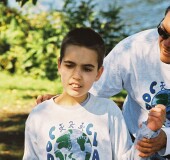Common Mechanisms May Contribute to Autism's Mutations
Inherited gene deletions affect developing brain's ability to make neural connections.
|
E-mail this article
Subscribe to news
Printer friendly version
|

(SOURCE: National Institute of Mental Health, news release, July 10, 2008)
THURSDAY, July 10 (HealthDay News) -- Common underlying mechanisms that affect brain development may be shared by the many seemingly disparate gene mutations found in autistic people, a new report shows.
The findings, published in the July 11 issue of Science, include two large sections missing on chromosomes in autistic people that appear to be tied to inherited mutations in genes regulated by neuronal activity.
"The emerging picture of the genetics of autism is quite surprising. There appear to be many separate mutations involved, with each family having a different genetic cause," National Institute of Mental Health (NIMH) Director Thomas R. Insel, whose organization lead the research, said in a NIMH news release. "The one unifying observation from this new report is that all of the relevant mutations could disrupt the formation of vital neural connections during a critical period when experience is shaping the developing brain."
The individually rare mutations have been previously found in at least 10 percent of sporadic cases of autism, which is the most common form.
This discovery was made in studying mutations linked to autism in families from the Middle East, Turkey and Pakistan, in which cousins married and had children with the disorder. This allowed researchers to pinpoint a relatively small group of genes responsible for disorders that can be amplified when relatives have children with each other.
The researchers found many different genetic causes of autism in the individuals with little overlap between the families with shared ancestry. A few large inherited autism-linked gene deletions in a small number of families, though, caught the researchers' eyes. The largest turned out to be in or near genes regulated, directly or indirectly, by neuronal activity.
"Autism symptoms emerge at an age when the developing brain is refining the connections between neurons in response to a child's experience," Walsh said. "Whether or not certain important genes turn on is thus dependent on experience-triggered neural activity. Disruption of this refinement process may be a common mechanism of autism-associated mutations."
More information
The National Autism Association has more about autism. 
Copyright © 2008 ScoutNews, LLC. All rights reserved. 
HealthDayNews articles are derived from various sources and do not reflect federal policy. healthfinder.gov does not endorse opinions, products, or services that may appear in news stories. For more information on health topics in the news, visit the healthfinder.gov health library.